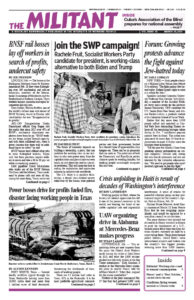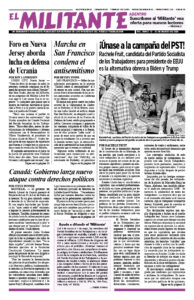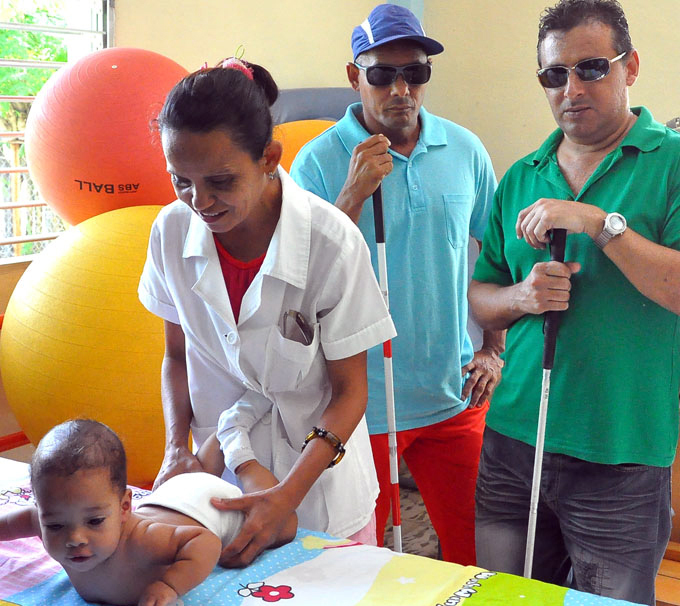HAVANA — The Havana International Book Fair is not just an event to display and promote literature and the arts. It’s also a place where you meet ordinary Cuban working people defending the conquests of their socialist revolution.
A good example was the bookstand of Cuba’s National Association of the Blind. There, socialist workers from the United States and Canada learned about how ANCI members, like other Cuban working people, use their mass organizations to respond to economic and social challenges today, which especially affect those with disabilities. How they draw on the working-class solidarity won through the revolution.
ANCI has been holding meetings across Cuba to elect delegates and vote on proposals for the association’s general assembly in November. They’ll discuss what they can do to alleviate the impact of the worldwide capitalist crisis, compounded by Washington’s unrelenting 65-year-long economic war to punish the Cuban people for making a socialist revolution. Local leaders of the Cuban Communist party, mass organizations and the government are invited to take part.
“After the 1959 triumph of the revolution, many argued that it was not necessary to form associations for people with disabilities, since the revolution’s inclusive approach would resolve everyone’s problems,” Karina González, ANCI’s vice president in Havana province, told the Militant. “But life demonstrated these associations are necessary.”
ANCI was founded in 1975. But even before that, people with disabilities, backed by Cuba’s revolutionary leadership, were involved in the social transformations carried out in the revolution’s early years. They broke down prejudices and other barriers, including the effort to create dignified jobs for all. In 1978 and 1980, the Cuban national associations of People with Physical and Motor Disabilities (Aclifim) and the Deaf (ANSOC) were created for the same purpose.
“This is an unfinished task,” said González, referring to their efforts to integrate persons with disabilities into the general workforce. In the late 1980s, she said — at the initiative of revolutionary leader Fidel Castro, as well as proposals by Aclifim members at their congress — workshops were created to help people with disabilities learn skills to help them make the transition into regular jobs.
“But that goal wasn’t accomplished,” said González. “Instead, people remained in these workshops until they retired,” doing work with no real connection to production.
“We need to find meaningful sources of employment,” González said. “Today there is not a single blind person working in the telephone company, a job where nonsighted people have worked historically,” she added. “I have a pharmacy degree, and I can assure you that a blind person can stuff blister packets into a box on a production line. What’s needed are reasonable adjustments to adapt workstations and production requirements.”
Reactivating these workshops, which are in dire need of materials and equipment due to lack of funding, was brought up by a delegate at the ANCI municipal assembly in Centro Habana Feb. 21. Two dozen people took part.
The delegates also discussed dangers from improvised garbage dumps that are multiplying on many Havana street corners, due to the lack of funds for fuel and spare parts for trucks. “Many problems we’re facing aren’t due just to the economic crisis, but to social indiscipline,” a delegate said, describing the efforts workers in one neighborhood went through to have a dumpster removed from the corner, only to find the area now occupied by electric bicycles blocking the walkway.
Others pointed to unsafe conditions created by the proliferation of small private businesses that set up tables and other physical obstacles on sidewalks. “No one is controlling this, and those responsible to do so often make things worse,” another delegate said. “ANCI’s national assembly must speak out about this.”
Strengthening solidarity
A good portion of the discussion at the meeting was dedicated to finding ways to strengthen working-class solidarity and social consciousness toward people with disabilities.
“It’s no secret we have shortages of everything in Cuba,” said 32-year-old Annelice Medero, who was born blind, graduated as a journalist, and is a leading member of ANCI in Havana. “We have to find ways for people who can’t be in the line at the crack of dawn at the pharmacy to also get medications when they become available. Without that, their health conditions get worse because they aren’t taking their medicine.”
Medero and others addressed the erosion in the time-honored practice fostered by the revolution that people with disabilities can move to the front of the line at grocery stores, banks and so on. Managers are often the source of this erosion, telling people with disabilities they have to stand in line like everyone else.
“But then I have to make sure no one is jumping the line in front of me, since I can’t see!” said an ANCI member. “Sometimes you’re told, ‘Your turn came a long time ago, but others went first.’”
“There is more pressure,” but these problems can be addressed. “Solidarity is deeply ingrained in Cuban people,” she said.
Centro Habana delegates unanimously rejected a proposal for an upper age limit of 60 for new ANCI members. That would limit the fight for inclusion of all in social and political activity, some argued. Many over 60 are perfectly able to be in ANCI and take on leadership, one delegate said. Living longer is “part of the achievements of our society, and we can continue to contribute.”
Delegates also spoke about efforts to recruit university students to work with ANCI. In Cuba students take on three years of social service after graduation. The proposal was aimed at raising social consciousness among young people. In other assemblies, ANCI members discussed challenges in housing and access to sport and recreational activities.
The U.S. rulers’ tightening economic, trade, and financial embargo “has made participation more difficult, and there are less activities due to the lack of resources,” said Eliannis Figueredo, an ANCI spokesperson from Granma province. “We are trying to find other ways of doing things.”
Support from revolutionary gov’t
During the book fair in Havana, the Pathfinder stand was visited by Luis Estruch Rancaño, author of Juan Almeida Bosque: Testimonios de un santiaguero 1970-2009. During those years, Estruch worked closely with Almeida, a central member of the leadership forged by Fidel Castro going back to the 1953 assault on the Moncada barracks that opened the revolutionary struggle.
After the revolution, when Almeida was assigned as party leader in Santiago de Cuba province, he came directly in touch with challenges faced by the associations of people with disabilities, said Estruch. He “became a champion of their demands.”
“Almeida was a bricklayer before the revolution,” said Estruch, when asked about the special training workshops. “He was a man with a trade, not a university professional.” So when he “saw that people with disabilities were being denied these trades, Almeida began to help with that movement.”
Estruch was governor of Santiago in 1996 when ANCI hosted an international conference there of organizations for the blind and the visually impaired. During the proceedings an earthquake hit Santiago, causing a blackout.
“Good heavens! What should I do?” Estruch asked himself in the middle of the dark auditorium. “This isn’t in my manuals as governor!”
“Then out of nowhere someone shouted, ‘Let’s form a little train! Luis, you be the engine!’ We marched out with each person holding the shoulder of the person in front, and I was the engine,” he said.
“A sighted person didn’t come up with the idea of the little train,” said Estruch. “A blind person did. The associations are aware of the scale of the problems their members face, and together we can find solutions.”


